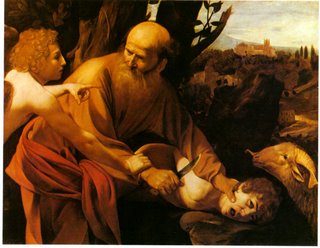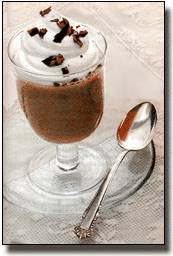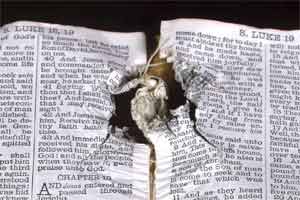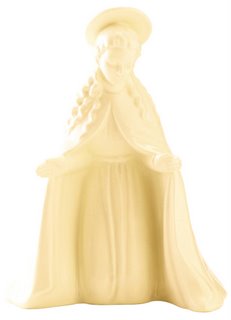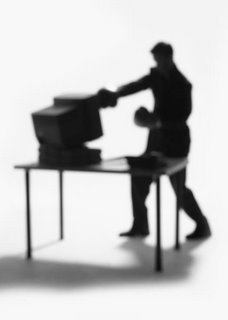June 3, 2006
Marian Devotion--Cath. response
Apologies go to those of you who were waiting for the Catholic response to this question. I know many (well, at least one) waited with held breath for this.
Anyways, this is a layered topic, and I run the risk of over-verbiage, but I'll try my best.
First of all, Catholics recognize 3 forms of devotion. The first is known as
latria, which is basically true worship and is reserved for God alone. I don't want to get onto the idea of transubstantiation right now, but that is why you see Catholics genuflect to the Tabernacle but not to the statues of Mary and the saints.
The second is known as
dulia, which is known as veneration to the saints. It isn't worship; instead it's a kind of respect Catholics have for those who "made it". Look at any sports fan (including me, who is still mourning the ill-fortune of my Buffalo Sabres). Things like autographed jerseys are treasured by the fan beause the fan looks up to the athlete. It's the same in the spiritual sense. The saint made it, he or she is up there, and
dulia is a way of saying "Cool, you're in. If the Big Guy is around, put in a good word for me, will you?"
Mary has a special case; devotion to her is known as
hyperdulia. It's basically
dulia on steroids. It also isn't worship, but the actions by some Catholics may make it seem so. Mary gets
hyperdulia by virtue of the Immaculate Conception (which is another topic that needs its own blog) and because of her act of free will noted in the Gospel of Luke accepting Archangel Gabriel's message (known as Mary's
"fiat mihi" by some Catholics). The idea is that Mary's "be it done unto me according to your word" was an important part of the Incarnation. In a way, it's been taught as a model for us: Mary said yes to God, and with that the Messiah came; Eve said no to God, and with that sin entered into the world.
Now, why do Catholics have a lot of
dulia and
hyperdulia going around when, to paraphrase Visa,
latria is all you really need. I'm not going to pretend to claim papal infallibility with this (which is probably a topic for yet another blog...I know, I should stop doing this...), but I gathered these thoughts recalling discussions I had with Catholics back in highschool, in my own parish, and the ones I see everywhere else.
One factor is that Protestants see Jesus a lot more personally than Catholics do. There is a lot of Jesus as "brother" and "personal saviour"; it's not that Catholics didn't traditionally believe this, but it wasn't as emphasized. What has traditionally been emphasized is Christ's divinity (again, remember the genuflections in Catholic churches). It's always been seen as inapproachable
ipso facto, but due to the Incarnation, God is now reachable by humans ("...and the Word was made flesh, and dwelled among us..."). Jesus, by becoming a man, has made the divine linked to humanity.
Another factor is that Catholics have multiple views on Jesus. We see him as the innocent child in the Infancy Narratives. He is loving Saviour who endured the all the torments of the Passion. He is the wise teacher with the parables and the Sermon on the Mount. He's the guy that did all those miracles (divinity again, you see). He's all that and more, and Protestants share these views with Catholics. The thing is that Catholics have one more view on Christ that Protestants don't emphasize as much. It's Christ as the Judge. It's in our creeds, it's in our art (Giotto and Michaelangelo), and it's in our catechism. So with all the benevolence that is associated with Christ that Catholics always have in mind, there is always that idea that we have to account for what we do in life to the Last Judgement. Take into consideration our doctrine of justification of faith and good works along with our "spiritual guilt complex" and our sacrament of Penance/Reconciliation, and you can understand that we look at Christ more as a parent than a brother; we love Jesus, but a part of us has this fear of messing up and getting in trouble.
Now what does all this have to do with
hyperdulia? With Jesus, there is that element of judgement in the Gospels ("Depart from me ye cursed", the fig tree that bore no fruit, "Get behind me Satan/Peter, etc.). With Mary, there is none of that. What do we see? She says yes to the Incarnation (which made the divine approachable to begin with), she visits Elizabeth while pregnant, she does her thing at Cana ("Do whatever he tells you"). There is no "just anger", and there is no judgement. As much as Jesus connects the divinity with redeemed humanity, there is an even closer connection to Mary. Yes, Jesus is the Way, the Truth, and the Life, but he's still God. Mary is still 100% human, just like us, but she's special because of the Immaculate Conception and her
fiat mihi. "Local girl makes it". She won't judge us, she won't condemn us, but she Jesus' mother. Who better to intercede for us to Jesus (especially when we think he's a touch peeved at our sins: "I was hung up on the cross for the sake of you all, and you are
still trying to ruin your co-worker's reputation??")?
So when Jesus puts Mary in the custody of John in the Gospel of John, Catholics look at it as the other way around. "Woman, behold your son." It's not so much that John took care of her while she lived out her life on earth than she'll watch out for us now.
So there it is. Catholics will receive communion, they'll go to confession, and they'll say their paternosters, but they'll also give props to Mary with their rosaries, Angelus, and the rest of it. You know, just in case...
Pax.
Iggy
